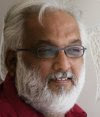There is very little doubt that architects and the architectural practises in India are loosing leadership in a rapidly growing but and a highly divided and skewed society. The architect today has disengaged with the larger debate of growth and development. The profession finds itself powerless. On the other hand the practitioners have quickly embraced the flat world, and has engaged in a process that easily identifies them with global imagery largely determined by a underlying neo-liberal environment.
A large part of what we call practice Is actually consultancy. Practice requires ideological thinking. One of the major reasons why architects cannot participate or lead new ideas of development is embedded in the nature of education. Little emphasis on liberal arts,humanities,innovative thinking in other fields, development of a world view are some of the missing links. Todays Architectural education system at Mumbai University is essentially focussed on producing Architects who can perform well in Architects offices . As my collegue,Rohit Shinkre rightly points out, the problem is compounded by the fact that the degree programme entitles you to a practicing license and therefore generates the need to orient our academic programme to respond to the practicing world.We need to widen the horizon and opportunities thru this education and therefore need to delink the two.
We must recognize the larger debate of equity and opportunity to equal access along with judicious growth. This to my mind will be the central debate of our foreseeable future. Our education programme must respond to and recognize our social and economic reality, and make it central to our academic programme. Recent Developments in civil society movements are a clear indicator of where we are heading. Public participation in decision making, and therefore a changing profile of clients call for redefining some of the skills, ethics and values , and knowledge base. If our institutions have to produce leaders:our education needs to lay emphasis on a question seeking approach rather than a problem solving one. subjects and teaching will have to concentrate on Indian thinking and the developing world.It would be equally important to cover the wide spectrum of developments across the globe. Students should be able to deal with brick as much with bio-mimicry , and be able to engage with architectural issues of Mumbai and new york with equal competence.
Our future generations will have to negotiate a path of global understanding and complex local issues.The academic programme will therefore have to constantly innovate for the larger good of our society we live in, and therefore the academic environment should be that which has the courage and conviction of venturing and exploring the unknown.
At two ends of the syllabus are two most important components of the process. The student and the teacher.The student today is a vastly different personality. While we may be concerned with equal access they are entrenched in "anytime access." Technology has changed their environment. Their ways and methods of accessing information, values and behavior pattern, nature of responses are all for us to learn, understand and account for in the working of our education programme.we will need to embrace that world whole heartedly. Use of technology in general and in teaching and interacting methods will have to be accounted for while structuring the academic programme.
If our education programme has to be driven by a leadership oriented question seeking academic environment then a provocative teacher and teaching methods would be central to its success. A teachers growth should be measured by contribution to academia and practice, critical thinking and an deep understanding of current issues in the field.
Finally for new thinking to emerge we need to establish a syllabus and assessing method that allows each institution enough freedom to develop its philosophy not just thru electives but thru some of its core subjects as well.
Thursday, March 8, 2012
Subscribe to:
Comments (Atom)
